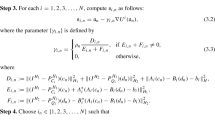Abstract
In this paper, a relaxation modulus-based matrix splitting iteration method is established, which covers the known general modulus-based matrix splitting iteration methods. The convergence analysis and the strategy of the choice of the parameters are given. Numerical examples show that the proposed methods are efficient and accelerate the convergence performance with less iteration steps and CPU times.
Similar content being viewed by others
References
Alanelli, M., Hadjidimos, A.: A new iterative criterion for H-matrices. SIAM J. Matrix Anal. Appl. 29, 160–176 (2006)
Berman, A., Plemmons, R.J.: Nonnegative matrix in the mathematical sciences. SIAM Publisher, Philadelphia (1994)
Bai, Z.-Z.: Modulus-based matrix splitting iteration methods for linear complementarity problems. Numer. Linear Algebra Appl. 17, 917–933 (2010)
Bai, Z.-Z.: On the convergence of the multisplitting methods for the linear complementarity problem. SIAM J. Matrix Anal. Appl. 21, 67–78 (1999)
Bru Garcia, R., Giménez, I, Hadjidimos, A.: Is A∈C n×n a general H-matrix? Linear Algebra Appl. 436, 364–380 (2012)
Bai, Z.-Z., Zhang, L.-L.: Modulus-based synchronous multisplitting iteration methods for linear complementarity problems. Numer. Linear Algebra Appl. 20, 425–439 (2013)
Bai, Z.-Z., Zhang, L.-L.: Modulus-based synchronous two-stage multisplitting iteration methods for linear complementarity problems. Numer. Algorithms 62, 59–77 (2013)
Cottle, R. W., Pang, J.-S., Stone, R. E.: The Linear Complementarity Problem. Academic, SanDiego (1992)
Dong, J.-L., Jiang, M.-Q.: A modified modulus method for symmetric positive-definite linear complementarity problems. Numer. Linear Algebra Appl. 16, 129–143 (2009)
Frommer, A., Mayer, G.: Convergence of relaxed parallel multisplitting methods. Linear Algebra Appl. 119, 141–152 (1989)
Hadjidimos, A., Lapidakis, M., Tzoumas, M.: On iterative solution for linear complementarity problem with an H-matrix. SIAM J. Matrix Anal. Appl. 33, 97–110 (2011)
Hadjidimos, A., Tzoumas, M.: Nonstationary extrapolated modulus algorithms for the solution of the linear complementarity problem. Linear Algebra Appl. 431, 197–210 (2009)
Hu, J.-G.: Estimates of \(||{B^{-1}C}||_{\infty }\) and their applications. Mathematica Numerica Sinica 4, 272–282 (1982)
Li, W.: A general modulus-based matrix splitting method for linear complementarity problems of H- matrices. Appl. Math. Lett. 26, 1159–1164 (2013)
Liu, S.-M., Zheng, H., Li, W.: A general accelerated modulus-based matrix splitting iteration method for solving linear complementarity problems. Calcolo, published online (2015)
Murty, K. G.: Linear Complementarity, Linear and nonlinear programming. Heldermann Verlag, Berlin (1988)
Ortega, J. M., Rheinboldt, W. C.: Iterative solution of nonlinear equations in several variables. SIAM, Philadelphia (2000)
van Bokhoven, W.M.G.: Piecewise-linear modelling and analysis. Proefschrift, Eindhoven (1981)
Zhang, L.-L.: Two-step modulus based matrix splitting iteration for linear complementarity problems. Numer. Algorithms 57, 83–99 (2011)
Zhang, L.-L., Ren, Z.-R.: Improved convergence theorems of modulus-based matrix splitting iteration methods for linear complementarity problems. Appl. Math. Lett. 26, 638–642 (2013)
Zheng, N., Yin, J.-F.: Accelerated modulus-based matrix splitting iteration methods for linear complementarity problems. Numer. Algorithms 64, 245–262 (2013)
Acknowledgments
The authors would like to thank the referees for their helpful comments. The work was supported by the National Natural Science Foundation of China (Grant No. 11271144, 61305036), Project of Department of Education of Guangdong Province (Grant No. 2013KJCX0053), University of Macau (Grant No. MYRG2015-00064-FST), the Opening Project of Guangdong Province Key Laboratory of Computational Science at the Sun Yat-sen University(Grant No. 2016005), the Opening Project of Guangdong Provincial Engineering Technology Research Center for Data Sciences and the Science Foundation of Shaoguan University (Grant No. SY2014KJ01).
Author information
Authors and Affiliations
Corresponding authors
Rights and permissions
About this article
Cite this article
Zheng, H., Li, W. & Vong, S. A relaxation modulus-based matrix splitting iteration method for solving linear complementarity problems. Numer Algor 74, 137–152 (2017). https://doi.org/10.1007/s11075-016-0142-7
Received:
Accepted:
Published:
Issue Date:
DOI: https://doi.org/10.1007/s11075-016-0142-7




